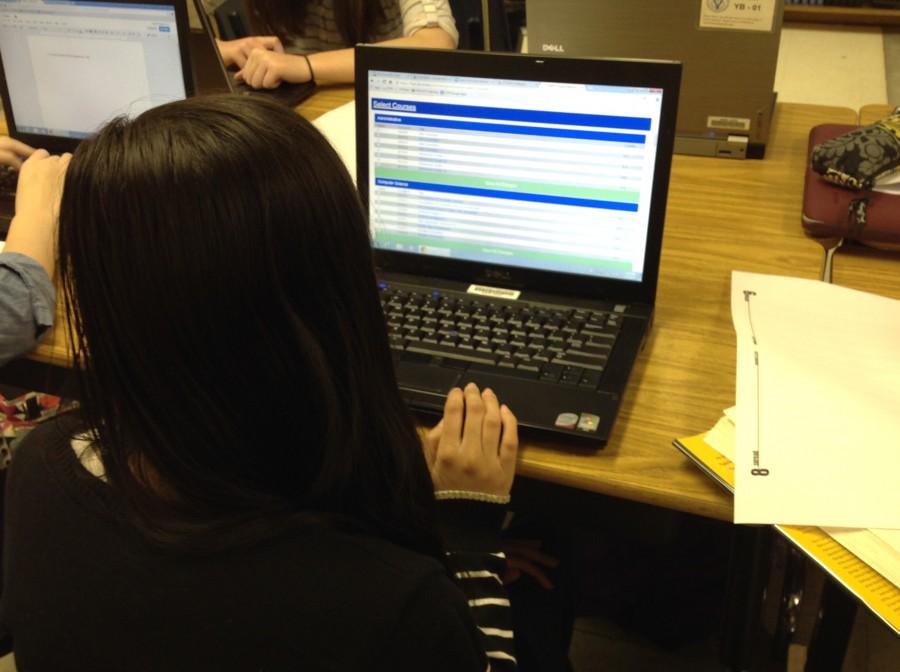Freshmen deliberate schedule selection
March 4, 2015
Along with a new semester, a mountain of snow days and Valentine’s Day, February also brings the difficult choices over which classes to take in the 2015-2016 school year.
With the deadline quickly approaching, Jefferson students must ask themselves a series of important questions.
Which classes should I take next year?
Should I take Advanced Placement (AP) Computer Science or AP Biology?
What about summer chemistry?
Summer physical education or summer language?
For many freshmen, these important decisions involve long hours of deliberation and mediation.
“At first my class choices were really unclear, and I spent a couple of weeks agonizing over of my choices,” freshman Evan Lin said. “I just could not decide what to take for my extra elective.”
The problem that freshmen face as opposed to older students is that many freshmen have not yet decided what senior research lab they are interested in. Additionally, freshmen have not had the experience of making major schedule selections in the past and thus can be more uncertain of their choices.
Luckily however, the Jefferson community has many assets available to freshmen to assist them in their decisions.
“I asked a lot of my friends, I asked my parents for suggestions and then I asked upperclassmen that had already taken those classes to help me decide what I needed to do. [I asked] some teachers too,” freshman Yadaven Saravanapavan said.
Authority figures can also provide guidance.
“Ask your counselor, he or she can give you a lot of help,” Lin said.
Another concern for students is whether to pursue a four year elective. Often, students want to continue playing an instrument after entering Jefferson but feel that they cannot fit a four year elective into their schedule. However, many students find these classes to be enjoyable and worthwhile.
“Band is happiness because we have Mr. Foreman, a very good band director, who will lead us to victory in the never ceasing quest to get a superior in assessments,” freshman Nathaniel Buchanan said. “We’ve got a great woodwind section and the trumpet section is very loud.”
Additionally, valuable classes such as journalism, photojournalism, art, and theatre are all offered for four years but can easily be neglected in the pursuit of a rigorous and mainstream schedule. Students often simply can’t find the time to fit an additional commitment into their schedule. However, it is possible.
“Take lots of summer courses, take language over the summer, take computer science over the summer, take math over the summer, take everything over the summer,” Buchanan said.
On the topic of course difficulty, students at Jefferson can get bogged down in trying to pursue the most rigorous path possible, even if that path is not what they are interested in. Scheduling becomes a game of, “Who can take the most AP courses and live?” The problem is that with many students, this approach can drain creativity and eliminate enthusiasm in learning.
“Since the freshmen will be losing tech next year, and that’s going to be substituted with another academic course, they need to make sure that they take that into account when they try to make balance for next year,” said Andrea Smith, counselor.
Another important aspect to focus on is that sophomore year should be a valuable time to discover interests and decide what to do at Jefferson, college and for life.
“I decided that I was going to take classes that would help me decide what I wanted to do in the future,” freshman Pranav Avasarla said. “I decided to take AP Biology and AP Computer Science to see if I wanted to continue with computer science.”
Although college is a weighty concern, focusing in on that one goal can detract from the ultimate goal of school: learning. Instead of taking classes to please colleges and build a nice resume, students ought to take classes that reflect their genuine interests.
“Obviously everybody usually thinks about college when they are deciding their classes, but for me, most of my classes I’m choosing for tenth grade I was going to take regardless of college,” Avasarla said. “Right now, I’m exploring all the different subjects that I could possibly do in eleventh and twelfth grade.”
At the end of the day, what’s really important is choosing a moderate blend of classes that emphasize your interests and reflect your concerns.
But as a final word of advice, “If all else fails, flip a coin,” Saravanpavan said.






